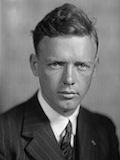Aviator Charles Lindbergh (1902-1974), a national hero for making the first solo transatlantic flight, later caused controversy by making extreme isolationist and antisemitic remarks which both outraged and intimidated many American Jews.
Lindbergh paid a friendly visit to Nazi Germany in 1936 and came away filled with “admiration for the German people,” as he put it. He also publicly praised Adolf Hitler, asserting that the Nazi leader had “done much for the German people.” By the time he made his second trip to Germany, in the autumn of 1938, Lindbergh was seriously considering taking up residence there. He was deeply impressed to find that Hitler’s Berlin was such a “healthy, busy, modern city.” At an official state dinner in October 1938, Hitler’s air force chief, Field Marshal Hermann Goering, acting “by order of the Fuhrer,” presented Lindbergh with a prestigious medal, the Service Cross of the German Eagle.
Even after Hitler’s annexation of Austria, the Kristallnacht pogrom, and the dismemberment of Czechoslovakia, Lindbergh continued to rationalize many of the Nazis’ actions. “Germany has pursued the only consistent policy in Europe in recent years,” he wrote in an April 1939 diary entry. “The question of right and wrong is one thing by law and another thing by history.”
During 1939-1941, Lindbergh emerged as the most prominent public spokesman for America First, the extreme isolationist group that opposed any U.S. action against Hitler.
In a radio address on October 13, 1939, six weeks after the German invasion of Poland and eruption of World War II, Lindbergh blamed the British and French for the war. He insisted that “if England and France had offered a hand to the struggling republic of Germany, there would be no war today.” Viewing Europe in racial terms, Lindbergh saw no reason for America to side with either side in the conflict: “Our bond with Europe is a bond of race and not of political ideology,” he asserted. “If the white race is ever seriously threatened, it may then be time for us to take our part in its protection, to fight side by side with the English, French and Germans, but not with one against the other for our mutual destruction.”
Despite the German conquest of Norway, Denmark, Holland, Belgium, and France in 1940, Lindbergh declined to reconsider his perspective. “Nothing is to be gained by shouting names and pointing the finger of blame across the ocean,” he declared in an August 4, 1940 radio broadcast. “Our accusations of aggression and barbarism on the part of Germany simply bring back echoes of hypocrisy and Versailles.”
The best known of Lindbergh’s speeches was the one he delivered at an America First rally in Des Moines, Iowa, on September 11, 1941. He accused “the Jews” of “pressing this country toward war,” and complained about what he called “their large ownership and influence in our motion pictures, our press, our radio and our government.” He also implicitly threatened American Jews, declaring: “Instead of agitating for war, the Jewish groups in this country should be opposing it in every possible way for they will be among the first to feel its consequences. Tolerance is a virtue that depends upon peace and strength. History shows that it cannot survive war and devastation.”
Ironically, mainstream American Jewish organizations had been extremely careful to refrain from urging U.S. military action against Hitler, precisely because they feared antisemites would call them warmongers.
Criticism of Lindbergh’s Nazi apologetics was widespread. Secretary of the Interior Harold Ickes called him “the number one fellow-traveler of the Nazis in the United States.” Time reported that with Lindbergh’s speech, “the America First Committee had touched the pitch of anti-Semitism and its fingers were tarred.” Residents of Lindbergh’s hometown, Little Falls, Minnesota, removed his name from their water tower.
In the years after World War II, Lindbergh continued to insist he had been right in opposing U.S. action against Hitler. Nonetheless, he was offered honorary degrees by Dartmouth College and the University of Notre Dame, served as consultant to Air Force Secretary W. Stuart Symington as well as his successor, Harold Talbott, and was treated like royalty by presidents from both parties.
President Harry Truman chose Lindbergh to visit postwar Germany and report on its aircraft development; President Eisenhower named him a Brigadier-General; Presidents Kennedy and Johnson entertained him at the White House; and President Nixon repeatedly invited Lindbergh to personally accompany him at major public events, including the return of the first astronauts to walk on the moon.
Sources: A. Scott Berg, Lindbergh, pp.358-359, 385-386; 425-428;
Medoff, FDR and the Holocaust, p. 131.











